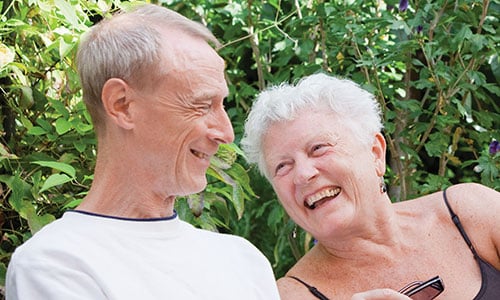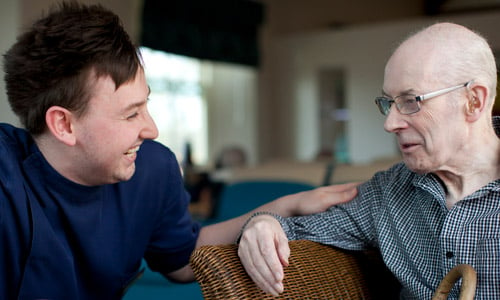We recently celebrated the 75th anniversary of the NHS, and at the anniversary service in Westminster Abbey we were reminded about the magical way the NHS turns “the idea of kindness into buildings and jobs”.
We also heard how “the NHS says something about who we are as a country, and who we want to be as a nation”.
Both of these principles ought to be at the forefront when we consider older people’s experiences of Health and Social Care. We've explored them in Age UK’s unique and powerful report, which we recently launched in Parliament.
What’s the current picture?
The report exposes the reality of the scale of the challenge facing older people in today’s NHS and social care system.

There are significant short term issues, from long waits for a social care assessment (in some places, people are waiting up to 8 months for just this first step in the journey to receive support) to large numbers of over-65s being taken to A&E by ambulance, too often for want of the effective health and care support they need at home. Hundreds of thousands of older people are also stuck in hospital beds even when medically fit to leave – a tragedy for them and a huge problem for the system as a whole.
On top of these short term challenges, there are even greater long term issues coming towards us. For example, while we should celebrate the fact that life expectancy has dramatically improved over the decades – with a man now expected to live 18.5 years longer and a woman 21 years longer, compared to 75 years ago – this remarkable achievement does also mean a much bigger, and growing, older population. In fact, the fastest growing group of all is the over-85s, which is projected to grow by two thirds over the next twenty years.
The number of people ageing without children is rising markedly too: by 2030, there will be 2 million. This matters because these people are far more likely to need a formal social care service since they are less able to call on family support.
So how have we got here?
Sadly, our report highlights how COVID has cast a long shadow over older people’s health and social care – one which continues to this day. Many older people lost their confidence and self-esteem, and often their mobility too, adversely affecting their physical and mental health.
Today there are thousands of older people, hidden from view, whose health is deteriorating and who are not getting sufficient support until an accident happens. There are also particular groups of people in deprived communities and from particular ethnic minorities whose needs are often very considerable, and yet who struggle to access services.
The data shows that overall, the outcomes are disappointing: many older people lack the social care they need, or end up in hospital when it might have been avoided.
So what next?
It’s time for a fresh approach to supporting older people: one which puts each individual person and their own needs at the centre. I’ve seen for myself in our local Age UKs the impact that innovative community and home-based approaches can have. Working in partnership with integrated care boards, local government and the NHS, these approaches can make a real difference to older people and help them stay well for longer.
There are brilliant examples across the country – from age-friendly hubs in Bradford to volunteer responders and integrated discharge teams in Wakefield, as well as countless health promotion and prevention initiatives, ranging from walking football to Silver Swans ballet.
At Age UK we are clear that our country needs a big shift in how we care for older people, characterised by 3 things:
- First, much more focus on prevention, extending to people in their run-up to retirement.
- Second, a fundamental principle of ‘home first’ in our approach to care. Rather than older people always having to go to hospital, it will often makes more sense for hospital to come to them, through Hospital at Home teams, Virtual Wards and the like.
- And third, a concerted drive to rebuild our primary and community health services and social care, so that many more older people get more help earlier. This will enable them to stay well for longer at home or in a care home, reducing their reliance on crisis care in hospitals.
We also need to join up these community-based services for older people and their families, so they are much easier to navigate. And they need to fully include the voluntary sector, and work closely with GPs and their teams.
You could say it’s like turning things inside out: from a focus on crisis intervention in hospitals, to a focus on individuals living in their own homes.
Recognising the changes
There’s no doubt we’ve come a long way in the 75 years of the NHS, and we should be proud of how it has enriched our lives and helped many of us to live longer. We ought to be equally proud of social care too, and profoundly grateful for the contributions of the millions of paid and unpaid carers in supporting legions of older people to keep going and live well.
But now it’s time to recognise the changes in our population we are already seeing and will increasingly see, and embark on a major change of approach: from hospital to home; from crisis to prevention and early intervention; and from siloed health and social care to joined up, local multi-disciplinary teams.
We can’t do this alone – please work with us to achieve the change we all want to see.
The State of Health and Care of Older People in England 2023
A call for joined up home and community based health and social care services for older people.






